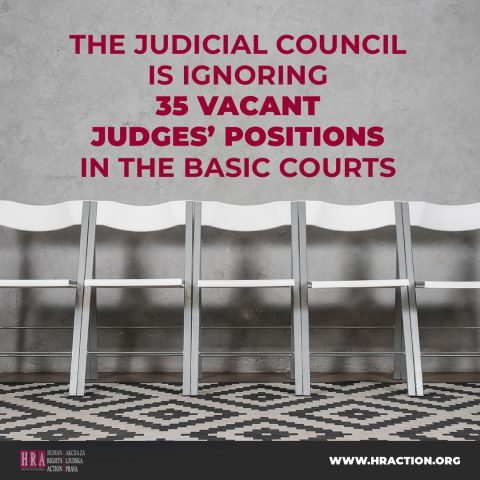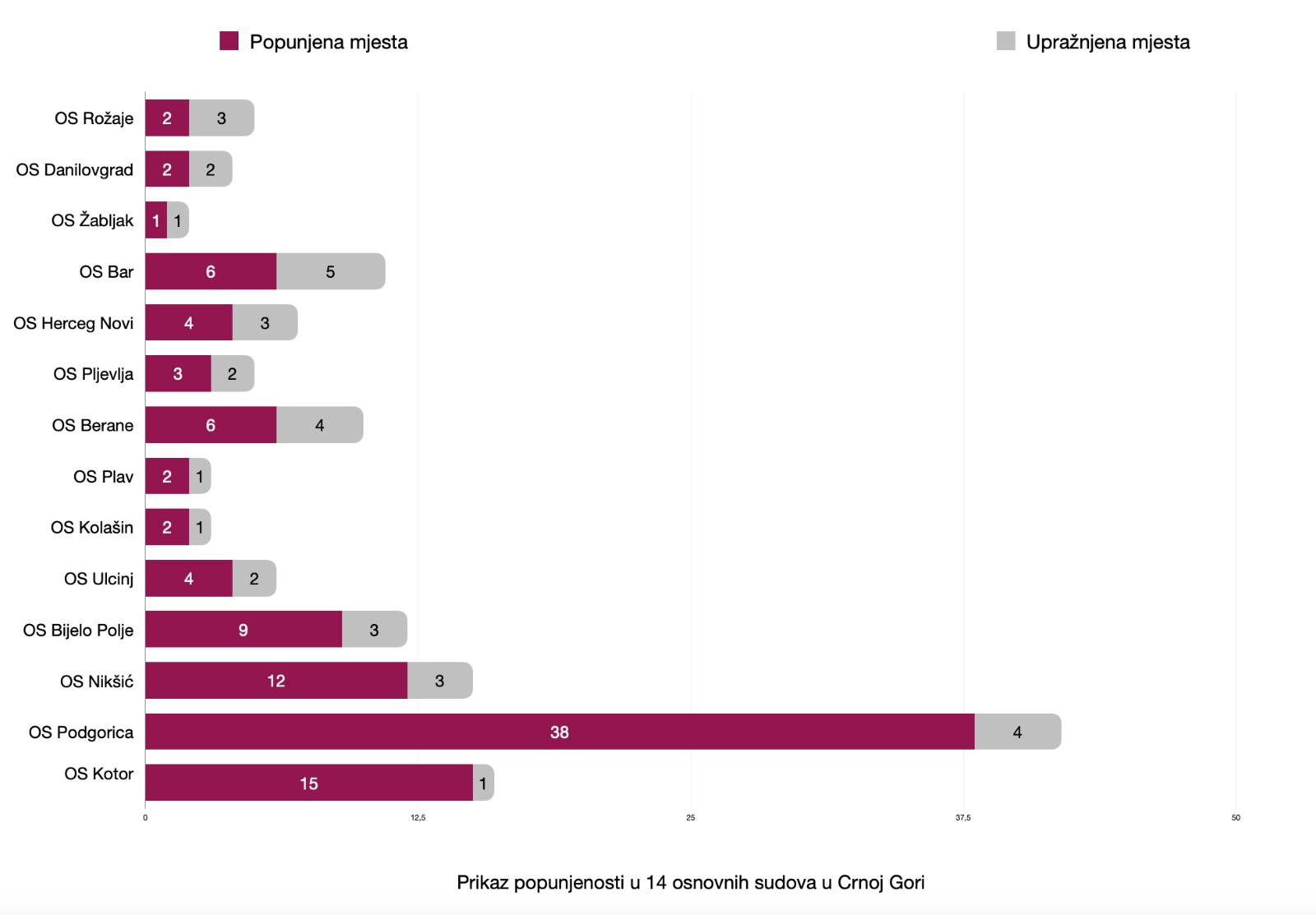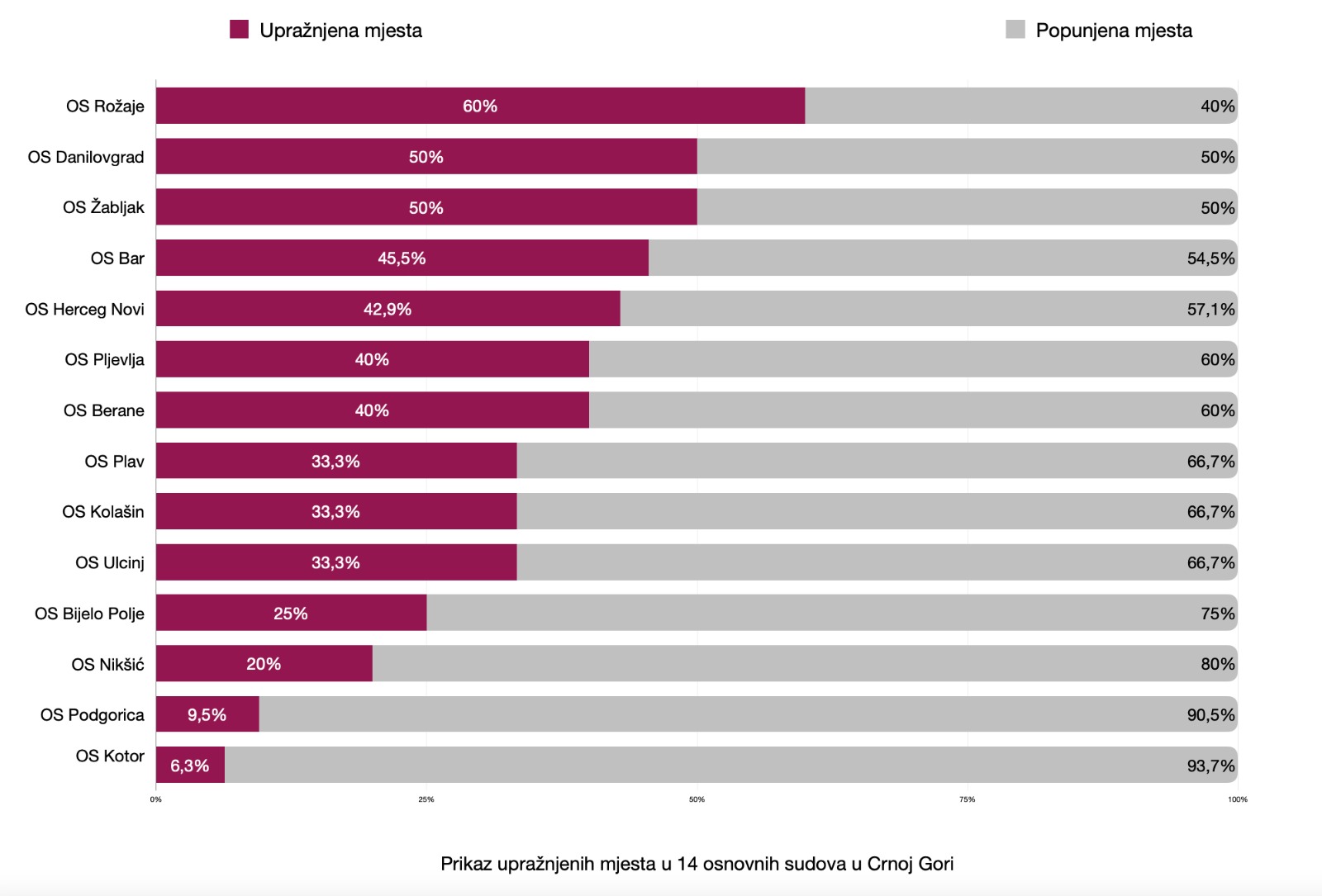
NEW VERDICT AWARDING COMPENSATION FOR DAMAGES DUE TO INEFFECTIVE INVESTIGATION OF THE POLICE TORTURE REPORT FROM OCTOBER 2015
20/07/2023
ANALYSIS OF THE APPLICATION OF THE LAW ON THE PROTECTION OF THE RIGHT TO A TRIAL WITHIN A REASONABLE TIME (2017 – 2022)
26/07/2023THE JUDICIAL COUNCIL IS IGNORING 35 VACANT JUDGES’ POSITIONS IN THE BASIC COURTS

Although the Montenegrin basic courts have no less than 35 vacant judges’ positions, which inevitably reflects on the promptness of their work, 100 days have passed since the Judicial Council failed to elect judges and appoint 11 candidates who successfully completed the initial training. Also, for 21 days, the Council has not responded to the letter in which the Human Rights Action drew attention to the above state of affairs, nor has it dealt with the issue at its last session on Thursday.
Each day of postponing the election of judges reduces the courts’ promptness, contrary to the public interest of achieving justice and the private interests of citizens who depend on court decisions. In addition, candidates who have successfully completed the training deserve to be elected as judges and, accordingly, acquire the right to judicial employment and a corresponding salary.
Of the 15 basic courts in Montenegro, as many as 14 are operating in a reduced capacity, lacking one to five judges. On the other hand, there are 11 candidates for judges who have successfully completed the 18 months long training on 18 April, but have not yet been assigned to the vacant positions.
The Basic Court in Bar thus lacks five judges, the Basic Courts in Berane and Podgorica – four each, while the Basic Court in Rožaje lacks three. The Court in Rožaje is missing more than half judges, the courts in Žabljak and Danilovgrad are missing half, while the courts in Bar, Berane, Pljevlja and Herceg-Novi are missing almost half.
The situation in the Basic Court in Herceg Novi is particularly problematic. That Court has operated with only three judges for seven months, even though it requires 7. During the interview the Judicial Council conducted last Sunday with the candidates for the president of the Basic Court in Herceg Novi, it was heard that a month ago the acting President of that court, Vesna Gazdić, has introduced overtime; that the number of unresolved cases has increased (there were 1,730 unresolved cases at the end of 2021, while at the end of 2022 there were 1,854); that 478 cases older than three years (the so-called red envelope cases) have remained unresolved at the end of 2022, and that, when it is not possible to form three-member chambers due to the lack of judges, the cases are forwarded to the Basic Court in Kotor. Back at the beginning of June, the Protector of Citizens asked that a judge be elected to the Civil Department of the court in Herceg-Novi.
On 3 August 2021, after a written test and interviews, the Judicial Council selected 15 candidates for judges who were referred to the 18 months long initial training in accordance with Article 54 of the Law on the Judicial Council and the Law on Judges. Out of this number, four[1] completed the training earlier and were elected as judges and appointed in mid-March and May 2022. The remaining 11 candidates completed the training on 18 April 2023. The Judicial Council gave each of them a “satisfactory” mark, stating that “decisions on their election and assignment will be made at one of the Council’s sessions in the near future”. However, more than three months, as well as 9 sessions, have passed since.
The candidates in question are the following: Miloš Jokanović, Ivana Žujović, Ivana Radović, Ana Rovčanin, Miloš Moračanin, Milica Ćetković, Hasira Bećović, Artan Kroma, Darko Božović, Tanja Kuburović Radusinović and Vera Femić.
As the problem was actualised on June 10, at the meeting during which the Human Rights Action presented its report entitled “Implementation of the Law on the Protection of the Right to Trial within a Reasonable Time 2017-2022”, we sent a letter to the Judicial Council, asking why is it that 11 candidates are still waiting for assignment when the number of vacancies is three times greater. According to Article 53 of the Law on the Judicial Council and the Law on Judges, until the decision on election and assignment, candidates for judges establish an employment relationship with the Basic Court in Podgorica, during which time they are entitled to a salary in the amount of 70% of that of a judge. They are currently still employed in the Basic Court in Podgorica and are receiving their salaries from that court’s budget.
As for the remaining vacant positions, 10 new candidates for judges were selected at the last session held on 20 July and referred to an 18-month long initial training, which they will finish at the end of January 2025. In addition, a new public competition for 15 candidates for judges’ positions has been announced at the end of June.
We appeal once again to the Judicial Council, its President Vesna Simović Zvicer, members from the ranks of distinguished lawyers Loro Markić, Dobrica Šljivančanin and Radoje Korać, members from the ranks of judges Sanja Konatar, Predrag Tabaš, Rade Ćetković, Radonja Radonjić, acting President of the Supreme Court of Montenegro Vesna Vučković and the Minister of Justice Marko Kovač to transparently explain the reasons for the existing situation. It is only through responsible and transparent action that the rule of law and fairness can be ensured for all citizens of Montenegro.
Below is a graphic overview of the occupancy of the basic courts in Montenegro:
[1] Two candidates have completed the initial training based on earlier regulations, which is why Article 64 of the Law on the Judicial Training Centre applies to them. It reads as follows: Advisers in the courts and the state prosecutor’s offices who have completed initial training in accordance with the Law on Education in Judicial Bodies (“Official Gazette of the Republic of Montenegro” no. 27/06) and are selected as candidates for judges, i.e. state prosecutors are required to attend the theoretical part of the initial training for two months and the practical part of the training for six months, in accordance with this Law. Other candidates for judges or state prosecutors, who have completed the initial training in accordance with the Law on Education in Judicial Bodies (“Official Gazette of the Republic of Montenegro” no. 27/06), are required to attend the theoretical part of the initial training for two months and the practical part of the training for nine months, in accordance with this Law. Two candidates underwent training earlier, but said training was interrupted after the Administrative Court annulled the decision on the selection of candidates.








 English
English